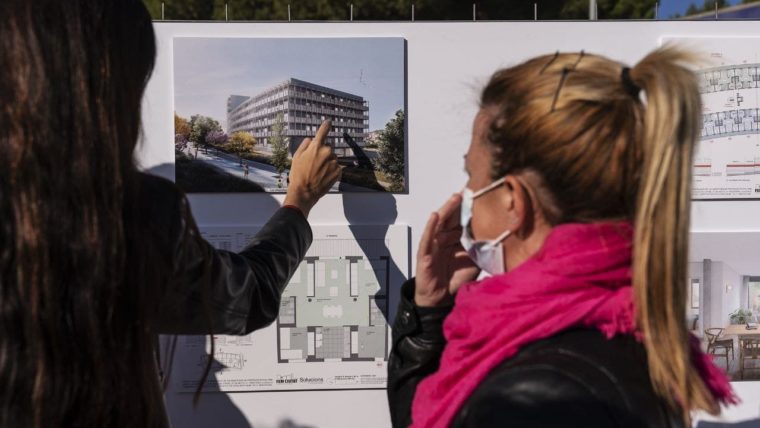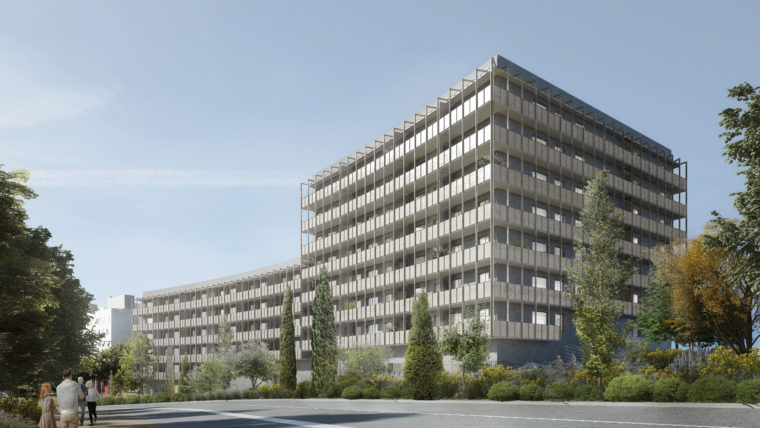Work starts on a new block in Horta-Guinardó to continue generating affordable housing on public land
Work is now under way on a new block of affordable housing in Barcelona. The project comes at a time where a record amount of social housing is currently being created in the city, with over 2,300 such homes either under construction or about to be built. Most developments are being implemented directly by the City Council, through the Municipal Institute for Housing and Renovation (IMHAB), but in an effort to boost the affordable housing pool further there are also delegated developments and collaborative projects with non-profit social housing organisations and cooperatives. This is the case with La Clota, a 105-flat development now under way in the district of Horta-Guinardó and which will provide homes for over 250 people.
Located at Av. Estatut de Catalunya, 15-17, the block corresponds to the delegated development strategy. The City Council is seeking to boost the public housing pool through cooperative housing, to strengthen non-profit initiatives and the social fabric and prevent property speculation. In this case, the IMHAB is granting the leasehold on the land to the cooperative Fem Ciutat SCCL for a period of 75 years, during which time the land will remain publicly owned and consequently the homes will never end up on the private market. La Clota is the second development by the cooperative Fem Ciutat on a permanently public-owned municipal plot of land. The first, which was handed over to tenants in 2018 and consists of 38 homes, is located in Pl. Gardunya, in the Raval neighbourhood.
Five hundred new affordable homes in Horta-Guinardó
The building will have 105 homes, providing housing for over 250 people. Of these, 94 will be for members of the cooperative, chosen from applicants for officially protected housing, who will each buy the leasehold for their flat. The draw was conducted according to territorial criteria, and because of this half the homes were reserved for people who have been resident for at least a year in one of the five neighbourhoods around the block. The building will also have three adapted flats, awarded to people with reduced mobility and specific needs. The other 11 flats will be managed by the IMHAB and offered with affordable public rents.
La Clota will be a building with two different heights, one section with six floors and another with eight. The homes will have a useful floor space of between 80 and 90 square metres, distributed into three bedrooms, two bathrooms, a kitchen, a dining and living room and a terrace. Sustainability was a major consideration in the design of the building: all homes will have cross-ventilation, with air and light for the main rooms coming directly from the exterior. In addition, the building’s rooftops will have solar panelling to help heat sanitary water, reducing the energy demands and emissions for the homes. The project was designed by Lluís Jubert – Taller d’Arquitectura SLP.
Public and community collaboration to boost the affordable housing stock
This project corresponds to the second public competition of public sites for housing cooperatives, launched by Barcelona City Council. Three plots were awarded through the competition and will include 150 cooperative homes between them. Besides the land for La Clota, one plot was awarded at the Casernes de Sant Andreu site for the cooperative La Regadora to build 35 homes, and the other in C/ General Vives (Sarrià) for the cooperative Torrent Viu to build a further 16.
With these developments, the City Council seeks to drive cohousing as a new model of ownership, management and coexistence, promoted since the last term of office. Including these two, there are eight projects of this type being driven by different cooperatives on municipally owned sites in Barcelona. Four of these have been completed and another two, including 37 homes, are under construction.
The latest step in delegated developments with the no-profit sector for social and cooperative housing was an agreement with the main social housing groups and foundations and the cooperative sector, whereby the City Council will offer leaseholds on municipal plots or buildings to be renovated so that these entities can promote rental homes and co-housing. A first stage has already been awarded, with seven co-housing projects to provide a total of 144 flats, and five developments for rental housing, between them offering 229 flats. The prevision is that the agreement will provide the framework for up to 1,000 new homes in conjunction with the social and cooperative sector in the next few years.












